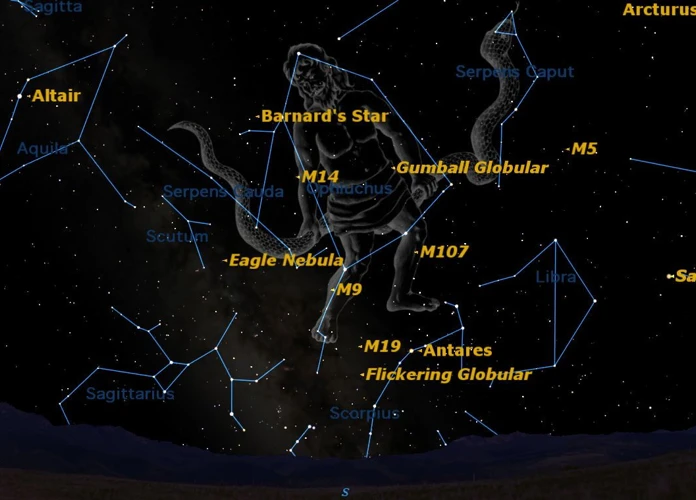In a world filled with celestial wonders, one area of the night sky holds a mysterious secret. Hidden among the constellations lies Ophiuchus, an enigmatic figure with mythological origins that have intrigued astronomers and stargazers for centuries. While commonly overshadowed by the traditional twelve zodiac signs, Ophiuchus possesses an intriguing story that reveals its deep connection to ancient Greek mythology. Join us as we delve into the mythological origins of the Ophiuchus constellation, exploring the legend of Asclepius, the controversy surrounding its inclusion in the zodiac, and the symbolic influence it has left on modern medicine. Prepare to be captivated by the tale of this forgotten celestial hero and the legacy he has left behind.
Contents
- The Legend of Asclepius
- Honoring an Ancient Hero
- The Influence of Greek Mythology
- The Ophiuchus Zodiac Controversy
- Conclusion
-
Frequently Asked Questions
- What is the mythological origin of the Ophiuchus constellation?
- Who was Asclepius and what made him special?
- What role did Asclepius play in Greek mythology?
- Was Asclepius able to bring the dead back to life?
- How did Asclepius acquire his healing powers?
- What is the connection between Asclepius and the serpent?
- Why did Zeus become angry with Asclepius?
- How did Asclepius become immortalized in the night sky?
- What other interpretations exist for the Ophiuchus constellation?
- How does the Ophiuchus constellation relate to modern medicine?
- References
-
Frequently Asked Questions
- 1. Is Ophiuchus a real constellation?
- 2. How did Ophiuchus get its name?
- 3. Why is Ophiuchus not part of the traditional zodiac?
- 4. What are the characteristics associated with Ophiuchus?
- 5. Does Ophiuchus have its own symbol?
- 6. How does Ophiuchus relate to the story of Asclepius?
- 7. What role does Ophiuchus play in astrology?
- 8. Is Ophiuchus recognized by astronomers?
- 9. What is the significance of the Ophiuchus constellation in modern medicine?
- 10. How can one embrace the energy of Ophiuchus?
- References
- Read More
The Legend of Asclepius
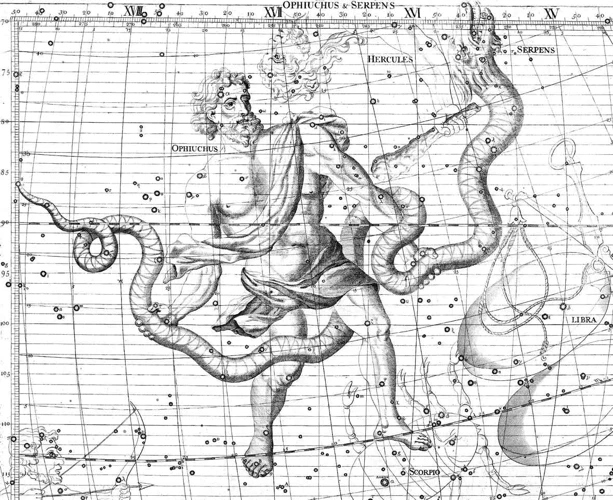
The Legend of Asclepius revolves around a revered figure in Greek mythology, known as the divine healer. Asclepius was believed to possess unparalleled knowledge and ability in the art of medicine. His story begins with his birth as the son of Apollo, the god of healing, and Coronis, a mortal woman. Asclepius inherited his father’s divine healing powers, and as he grew older, his skill in medicine surpassed all others. He became renowned for his ability to cure the most incurable diseases and even revive the dead. The embodiment of mercy and compassion, Asclepius used his powers to heal countless individuals, restoring their health and granting them a second chance at life. His reputation as a miraculous healer spread far and wide, attracting people from all corners of the ancient world seeking his aid in times of distress. The legacy of Asclepius’s healing prowess made him a revered figure, worshipped in various sanctuaries and temples dedicated to his name. His divine healing staff, entwined with a serpent, became a symbol associated with medicine and is still used today as a symbol of healing. The story of Asclepius and his extraordinary healing abilities sets the stage for the significance of the Ophiuchus constellation and its enduring influence in the realms of medicine and mythology.
Asclepius, the Divine Healer
Asclepius, the divine healer, possessed extraordinary powers granted to him by his divine lineage. As the son of Apollo, the god of healing, he inherited a deep understanding of medicine and the ability to alleviate suffering. Asclepius was known for his unwavering dedication to the art of healing and the compassion he showed towards those in need. His vast knowledge of medicinal herbs and therapies enabled him to cure even the most severe ailments. People came to him from far and wide, seeking his wisdom and guidance in the pursuit of health and well-being. Asclepius’s skills as a healer extended beyond physical ailments; he offered solace for emotional and spiritual suffering as well. His gentle demeanor and the solace he provided earned him the trust and admiration of all who sought his aid. The tales of his miraculous healings spread throughout ancient Greece, immortalizing him as a divine figure with the power to restore life and hope. Asclepius’s contributions to the art of healing continue to inspire and shape the medical field, making him a revered symbol of compassion and benevolence. His story not only intertwines with the Ophiuchus constellation but also leaves a lasting impact on the perception of medicine and the power of healing.
The Serpent and the Healing Staff
The Serpent and the Healing Staff are two powerful symbols deeply intertwined with the legend of Asclepius. Asclepius was often depicted holding a staff with a serpent wrapped around it, known as the Rod of Asclepius. This imagery has since become synonymous with medicine and healing. The serpent is a symbol associated with rebirth and rejuvenation in many ancient cultures, representing the shedding of old skin and the renewal of life. In Greek mythology, the serpent holds particular significance, as it is believed to have been a gift to Asclepius from the divine goddess Athena. The serpent’s presence represents both the wisdom and the healing powers bestowed upon Asclepius by the gods. The staff itself symbolizes authority and power, serving as a tangible representation of Asclepius’ ability to heal and cure. To this day, the Rod of Asclepius is widely recognized as the emblem of the medical profession, adorning the uniforms, logos, and signage of healthcare facilities worldwide. Its enduring presence reminds us of the ancient connection between medicine, sacred healing, and the mythical origins of the Ophiuchus constellation.
The Wrath of Zeus
The Wrath of Zeus fell upon Asclepius when he committed an act that upset the balance of life and death. The divine healer’s ability to revive the dead drew the attention of Hades, the god of the underworld. Hades grew furious that souls were being snatched from his domain, disrupting the natural order of existence. Fueled by jealousy and anger, Hades complained to Zeus, the king of the gods. Zeus, upon hearing Hades’ grievances, decided to punish Asclepius for his transgression. With a thunderous display of divine justice, Zeus struck down Asclepius with a bolt of lightning, ending his mortal life. The loss of Asclepius devastated the world, as people mourned the loss of their beloved healer. However, even in death, Asclepius’s legacy persevered, as he was immortalized in the night sky as the constellation Ophiuchus, forever reminding humanity of his extraordinary healing powers and the consequences of challenging the gods’ authority.
Honoring an Ancient Hero
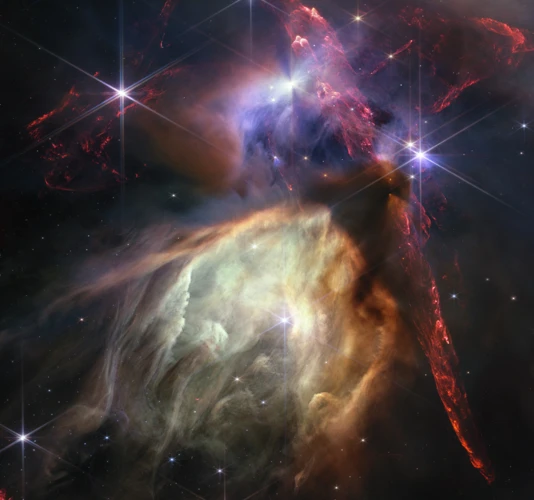
Honoring an Ancient Hero, the Ophiuchus constellation holds a special place in the night sky. Its positioning between the constellations of Serpens and represents the figure of Asclepius, the legendary healer. The ancient Greeks revered Asclepius for his extraordinary abilities and considered him a hero of immense importance. To honor his legacy, the celestial placement of Ophiuchus reflects his story and mythological significance.
The transformation of Asclepius into the Ophiuchus constellation showcases the admiration and respect that the Greeks had for this revered figure. Asclepius’s association with healing and medicine made him a beloved figure, with numerous temples and sanctuaries erected in his honor throughout the ancient Greek world. The inclusion of Ophiuchus in the night sky serves as a reminder of his remarkable deeds and the impact he had on the lives of those he cured.
Alternative interpretations of the constellation’s placement also exist. Some suggest that Ophiuchus represents Laocoön, a Trojan priest from Greek mythology who was famous for his role in the Trojan War. Others connect Ophiuchus to Apis, an Egyptian god associated with healing and serpents. Although these interpretations differ, they do not diminish the significance of Ophiuchus as a celestial tribute to a hero whose healing abilities were legendary.
The story of Asclepius and the transformation of his legacy into the Ophiuchus constellation reminds us of the ancient Greeks’ reverence for their heroes. The celestial positioning of Ophiuchus ensures that the memory of Asclepius and his extraordinary healing powers will forever shine brightly in the night sky, inspiring awe and admiration for generations to come.
The Placement in the Night Sky
The Placement in the Night Sky of the Ophiuchus constellation is an intriguing aspect of its mythological origins. Positioned between the constellations of Scorpius and Sagittarius, Ophiuchus is depicted as a man holding a large serpent. According to Greek mythology, this figure represents Asclepius, the divine healer, who was transformed into a constellation after his death. Ophiuchus is visible in the Northern Hemisphere during the summer months, where it can be seen slithering across the night sky alongside other prominent zodiac constellations. Its positioning near Scorpius is especially symbolic, as the serpent is seen as a representation of evil and mortality, while Ophiuchus embodies healing and immortality. The juxtaposition of these two constellations adds depth to the mythological narrative and emphasizes the dualities present within the Ophiuchus constellation.
The Transformation into a Constellation
The transformation of Asclepius into a constellation is a remarkable tale passed down through mythology. According to the legend, Zeus, the king of the gods, grew increasingly jealous of Asclepius’ healing abilities, fearing that mortals would seek the divine healer’s aid over their own worship of the gods. In a fit of rage, Zeus struck Asclepius down with a thunderbolt, ending his mortal life and sending him to the stars. However, recognizing Asclepius’ immense contributions to humanity, Zeus decided to honor him by placing him among the constellations. Thus, Asclepius was immortalized as the Ophiuchus constellation, represented as a man holding a serpent-entwined staff. The transformation symbolized the eternal legacy of healing and compassion that Asclepius embodied during his mortal life. Today, Ophiuchus stands as a testament to the ancient hero’s great deeds and serves as a reminder of the power of medicine and the enduring impact of one man’s actions.
Alternative Interpretations
Alternative Interpretations of the Ophiuchus constellation have emerged through the ages, offering different perspectives on its symbolism and significance. While the most popular narrative associates Ophiuchus with the legendary healer Asclepius, there are other interpretations that offer alternative explanations. One interpretation suggests that Ophiuchus represents the ancient Egyptian god Imhotep, who was also revered for his healing abilities and considered a wise sage. Another interpretation connects Ophiuchus with the Babylonian god known as Nergal, who was believed to bring both destruction and healing. In this viewpoint, Ophiuchus symbolizes the dual nature of medicine, encompassing both the power to heal and the potential for harm. Additionally, some astrologers have proposed that Ophiuchus represents a new zodiac sign, expanding the traditional twelve signs to thirteen. This perspective has sparked debates and controversies within the realm of astrology. While these alternative interpretations provide intriguing possibilities, the legend of Asclepius remains the most widely recognized and deeply rooted explanation for the existence of the Ophiuchus constellation.
The Influence of Greek Mythology
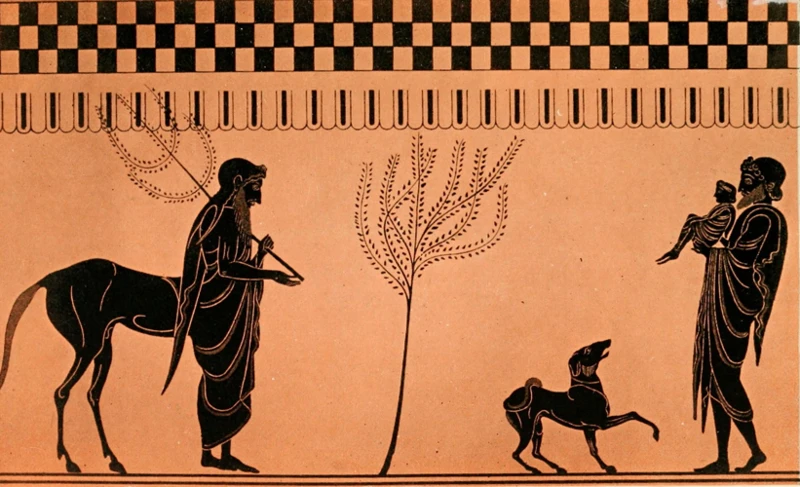
The Influence of Greek Mythology extends far beyond the pages of ancient texts, permeating various aspects of human culture and society. Greek mythology has provided a rich tapestry of stories and characters that continue to captivate and inspire to this day. Asclepius, the mythical healer, plays a significant role in these tales, serving as a symbol of healing and divine connection. His stories are intertwined with gods, goddesses, and other mythical figures, creating a vast network of mythological narratives that have shaped Greek culture and beyond. In these myths, Asclepius is often depicted as a central figure, showcasing his incredible healing abilities and his association with serpents, a symbol of renewal and rebirth. These stories not only entertained ancient audiences but also conveyed important moral lessons and conveyed a deeper understanding of the human condition. The legends of Asclepius continue to be passed down through generations, reminding us of the power of healing and the enduring legacy of ancient Greek mythology. This influence extends beyond the realm of storytelling and has found its way into modern medicine, where the symbol of Asclepius’s serpent-entwined staff, known as the Rod of Asclepius, is recognized as a universal symbol of healing and healthcare. This integration of mythological symbolism demonstrates the enduring impact of Greek mythology on our collective consciousness and provides a connection between ancient wisdom and contemporary practice.
Asclepius in Mythological Tales
Asclepius’s extraordinary healing abilities and his prominent role in Greek mythology led to his appearance in various mythological tales. One of the most famous stories involving Asclepius is the resurrection of Hippolytus. When the son of Theseus, Hippolytus, was killed in a chariot accident, his grieving father sought the help of Asclepius to bring him back to life. Moved by the overwhelming sorrow of Theseus, Asclepius successfully resurrected Hippolytus, defying the natural order of life and death. This act enraged the god of the underworld, Hades, who complained to his brother Zeus about the interference with the domain of the dead. In response, Zeus struck down Asclepius with a thunderbolt, punishing him for disturbing the balance between life and death. The divine healer’s death resulted in profound grief among the mortals who revered him and led to the establishment of cults and sanctuaries dedicated to his honor. The mythological tales surrounding Asclepius serve as a testament to his extraordinary powers and the lasting impact he had on ancient Greek society. Through these tales, his influence as a divine healer and the inspiration behind the Ophiuchus constellation’s mythical origins is perpetuated.
Healing and the Divine Connection
Healing and the Divine Connection have always been closely intertwined in Greek mythology, and the story of Asclepius exemplifies this deep connection. As the son of Apollo, the god of healing, Asclepius inherited not only his father’s medical knowledge but also a divine affinity for healing. It is believed that Asclepius was taught the art of medicine by the wise centaur Chiron, who imparted his extensive knowledge to the young demigod. This divine connection to healing is further emphasized by the presence of serpents in Asclepius’s story. Asclepius is often depicted holding a staff entwined with a serpent, known as the staff of Asclepius or the Rod of Asclepius. The serpent has long been associated with healing and rebirth in various mythologies around the world. In Greek mythology, serpents were seen as sacred creatures representing wisdom, transformation, and renewal. Thus, the intertwining of the serpent and the healing staff became a powerful symbol of healing and divinity. Even today, the emblem of the serpent-entwined staff is commonly used as a symbol of medicine, demonstrating the enduring influence of Asclepius’s divine connection to healing. This symbolic link between healing and the divine highlights the profound belief in the supernatural origins of healing practices in ancient times and serves as a testament to the lasting impact of Asclepius and his healing legacy.
The Symbolism in Modern Medicine
The symbolism of the Ophiuchus constellation holds a significant place in modern medicine. The association between Asclepius, the divine healer, and the serpent-entwined staff has become the universal symbol of healing and healthcare. This iconic image is widely recognized as the caduceus, which is prominently displayed on medical logos, uniforms, and institutions worldwide. However, it is important to note that there is some debate regarding the appropriate symbol for medicine, as the rod of Asclepius, a single serpent-entwined staff, is considered by many to be the authentic symbol of medicine. Despite this controversy, the caduceus has firmly entrenched itself in the field, often representing the complexities of healthcare and the balance needed for healing. The intertwining of the serpent around the staff is thought to symbolize the dual nature of medicine, encompassing both life and death, as well as the associated ideas of rebirth, regeneration, and transformation. The influence of Ophiuchus in modern medicine extends beyond its symbolism, as Asclepius’s legacy of compassion and healing continues to inspire medical professionals to this day. The principles of empathy, patient care, and the pursuit of knowledge in the medical field all find their roots in the story of Asclepius, reminding us of the profound impact that ancient mythology continues to have on our understanding and practice of medicine.
The Ophiuchus Zodiac Controversy
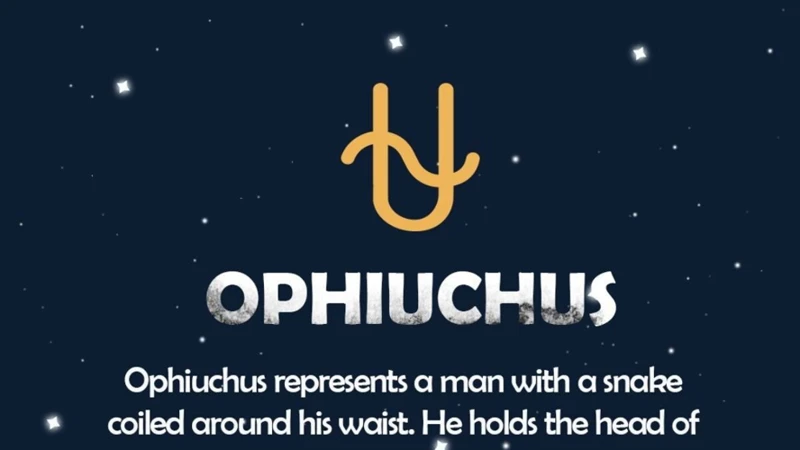
The Ophiuchus Zodiac Controversy stems from the inclusion of the thirteenth zodiac sign, Ophiuchus, which disrupts the traditional twelve-sign astrological system. Ophiuchus, represented by a serpent-bearer, has long been overlooked in mainstream astrology. However, its rediscovery in the modern era has sparked debates and discussions among astrologers and enthusiasts. The controversy arises from the fact that the inclusion of Ophiuchus would require shifting the dates of the existing zodiac signs, altering the established astrological calendar. Proponents argue that Ophiuchus brings new energies and attributes to the zodiac system, offering a more comprehensive and accurate representation of individuals’ personalities and life paths. Skeptics, on the other hand, question the practicality of adding an extra sign and argue that it undermines the longstanding astrological traditions. Despite the ongoing debate, some individuals resonate deeply with the traits associated with Ophiuchus, finding a stronger alignment with this lesser-known sign. Whether one believes in the validity of Ophiuchus or not, the controversy surrounding its inclusion demonstrates the ever-evolving nature of astrology and the enduring fascination humans have with the stars and their influence on our lives.
The Discovery of Ophiuchus
The Discovery of Ophiuchus is an intriguing tale in the realm of astronomy. While the existence of this constellation has been known for centuries, its significance and recognition took time to unfold. Ophiuchus, also known as the “Serpent Bearer,” was first catalogued by the Greek astronomer Ptolemy in the 2nd century as part of his monumental work, the Almagest. However, it was not included as one of the traditional zodiac constellations. Over time, astronomers and stargazers became more aware of Ophiuchus and its position in the night sky. The constellation is located near the celestial equator, between Sagittarius and Scorpius. Its shape, resembling a human figure holding a serpent, adds to its mystique. Despite not being officially recognized as a zodiac sign, many astrologers have debated its inclusion due to its presence in the ecliptic, the path of the Sun throughout the year. This discovery has sparked discussions and controversies, challenging the traditional understanding of astrology and prompting a reevaluation of the zodiac system. The quest to understand and embrace the energy of Ophiuchus continues to captivate both astronomers and astrology enthusiasts alike.
Implications on Astrology
The inclusion of Ophiuchus in the zodiac has significant implications on astrology and the traditional twelve zodiac signs. While the twelve signs have long been used to interpret and analyze personality traits and predict future events, the introduction of Ophiuchus challenges the established system. Ophiuchus is often referred to as the “13th zodiac sign,” as it falls between Scorpio and Sagittarius in the ecliptic. Astrologers who recognize Ophiuchus believe that those born under this sign possess unique characteristics and qualities. They are seen as natural healers, with a deep understanding of the intricate connections between the mind, body, and spirit. Ophiuchus individuals are also associated with wisdom, intuition, and a tendency to seek truth and knowledge. However, the inclusion of Ophiuchus in astrology has its critics, who argue that it disrupts the balance and symmetry of the zodiac system. Traditional astrologers may dismiss Ophiuchus, choosing to stick with the classic twelve zodiac signs. Nonetheless, the presence of Ophiuchus introduces new perspectives and challenges the conventional understanding of astrology. Its implications on astrology continue to spark debates and discussions among astrologers and enthusiasts alike.
Embracing the Ophiuchus Energy
Embracing the Ophiuchus energy allows individuals to tap into the unique qualities associated with this lesser-known constellation. Ophiuchus is said to possess characteristics such as wisdom, intuition, rejuvenation, and transformation. Those who resonate with the Ophiuchus energy are believed to have a natural inclination towards healing, both physically and emotionally. They have the ability to navigate the complexities of life, offering guidance and support to those around them. Ophiuchus energy encourages individuals to embrace their true selves and explore their spiritual and healing abilities. It is important to note that although Ophiuchus is not traditionally recognized in astrology, incorporating its energy into one’s life can bring about a sense of balance and alignment. By embracing the qualities associated with Ophiuchus, individuals can embark on a journey of self-discovery, healing, and personal growth. Just as this ancient constellation defies the boundaries of the traditional zodiac, individuals can break free from societal expectations and embrace their own unique path. Embracing the Ophiuchus energy allows for transformation and opens up a world of possibilities, leading to a deeper connection with oneself and those around them.
Conclusion

In conclusion, the mythological origins of the Ophiuchus constellation reveal a captivating tale of Asclepius, the divine healer. Through his divine parentage and exceptional healing abilities, Asclepius became a revered figure in ancient Greek mythology. His story, intertwined with the symbol of the serpent and healing staff, represents the eternal connection between medicine and spirituality. While the controversy surrounding Ophiuchus’s inclusion in the zodiac persists, its impact on astrology and the recognition of the thirteenth sign cannot be ignored. Asclepius’s influence extends beyond ancient mythology, with his symbolism deeply embedded in modern medicine as a sign of healing and hope. The discovery of Ophiuchus and its placement in the night sky unveils a hidden celestial hero, whose legacy transcends time and continues to fascinate those who gaze upon the stars. As we embrace the energy and story of Ophiuchus, we honor the remarkable mythical figure of Asclepius and the profound connections between mythology, astronomy, and human understanding.
Frequently Asked Questions

What is the mythological origin of the Ophiuchus constellation?
The Ophiuchus constellation finds its mythological origins in the legend of Asclepius, the divine healer of ancient Greece.
Who was Asclepius and what made him special?
Asclepius was the son of Apollo and a mortal woman who possessed extraordinary healing powers. He was revered as the greatest healer of his time.
What role did Asclepius play in Greek mythology?
Asclepius played a significant role in Greek mythology as the deity associated with healing, medicine, and rejuvenation.
Was Asclepius able to bring the dead back to life?
According to the legends, Asclepius had the remarkable ability to revive the dead, making him a symbol of miraculous healing.
How did Asclepius acquire his healing powers?
Asclepius inherited his divine healing powers from his father, Apollo, the god of healing and medicine.
What is the connection between Asclepius and the serpent?
In the legend of Asclepius, a serpent played a crucial role in the divine healer’s life, symbolizing rejuvenation and healing.
Why did Zeus become angry with Asclepius?
Zeus became angry with Asclepius because he used his powers to bring the dead back to life, which disrupted the natural order of life and death.
How did Asclepius become immortalized in the night sky?
As a tribute to his extraordinary healing abilities, Asclepius was immortalized in the night sky as the constellation Ophiuchus.
What other interpretations exist for the Ophiuchus constellation?
While the Ophiuchus constellation is commonly associated with Asclepius, alternative interpretations link it to other figures, such as the legendary healer Imhotep of ancient Egypt.
How does the Ophiuchus constellation relate to modern medicine?
The symbol of the serpent entwined around a staff, associated with the Ophiuchus constellation, is widely recognized as a symbol of medicine and is used in modern healthcare settings.
References
- Ophiuchus – StarDate Online
- Ophiuchus Constellation (the Serpent Bearer)
- Ophiuchus Location, Mythology & Features – Study.com
Frequently Asked Questions

1. Is Ophiuchus a real constellation?
Yes, Ophiuchus is indeed a real constellation. It is located in the southern sky and can be seen in certain parts of the world during specific seasons.
2. How did Ophiuchus get its name?
The name “Ophiuchus” originates from Greek mythology. It is derived from the Greek word “ophis,” meaning serpent, and “ouchos,” meaning holding.
3. Why is Ophiuchus not part of the traditional zodiac?
Ophiuchus is not part of the traditional zodiac because the zodiac was established thousands of years ago and only includes twelve constellations, each representing a specific astrological sign.
4. What are the characteristics associated with Ophiuchus?
Ophiuchus is often associated with qualities such as wisdom, healing, transformation, and spiritual growth. People born under this sign are believed to possess powerful intuition and the ability to heal themselves and others.
5. Does Ophiuchus have its own symbol?
Yes, Ophiuchus has its own symbol. It is represented by a serpent entwined around a staff, which is known as the Rod of Asclepius, a symbol commonly associated with healing and medicine.
6. How does Ophiuchus relate to the story of Asclepius?
Ophiuchus is closely associated with the mythological figure of Asclepius, a renowned healer in Greek mythology. Asclepius was believed to possess the power to bring the dead back to life, a feat that angered the gods.
7. What role does Ophiuchus play in astrology?
Ophiuchus has gained attention in recent years as people debate whether it should be included as the thirteenth zodiac sign. Its addition would cause a shift in the astrological calendar and impact the interpretations of individuals’ birth charts.
8. Is Ophiuchus recognized by astronomers?
Yes, Ophiuchus is recognized by astronomers as a constellation in the night sky. However, its significance in astrology is a topic of debate and varies depending on individual perspectives.
9. What is the significance of the Ophiuchus constellation in modern medicine?
The Ophiuchus constellation holds symbolic value in modern medicine due to its association with the Rod of Asclepius. This symbol is widely recognized as a representation of healing and is often used in the medical field.
10. How can one embrace the energy of Ophiuchus?
Embracing the energy of Ophiuchus involves exploring and nurturing one’s healing abilities, focusing on personal growth and transformation, and connecting with the wisdom and intuition associated with this constellation.

